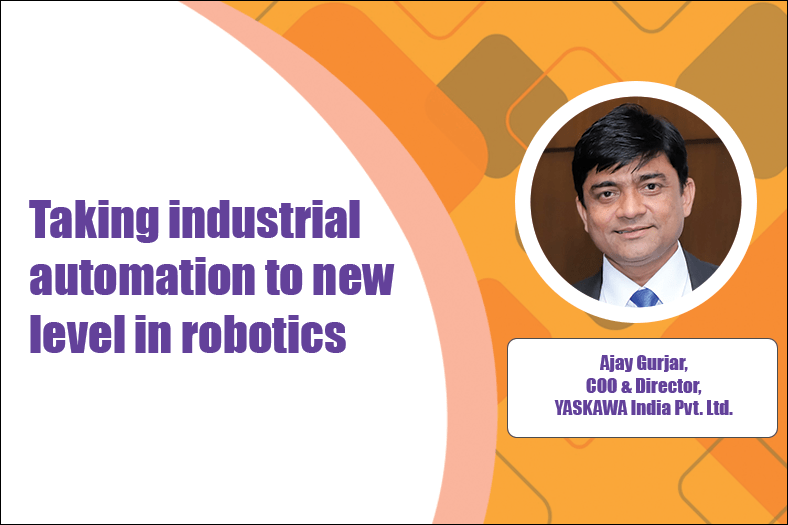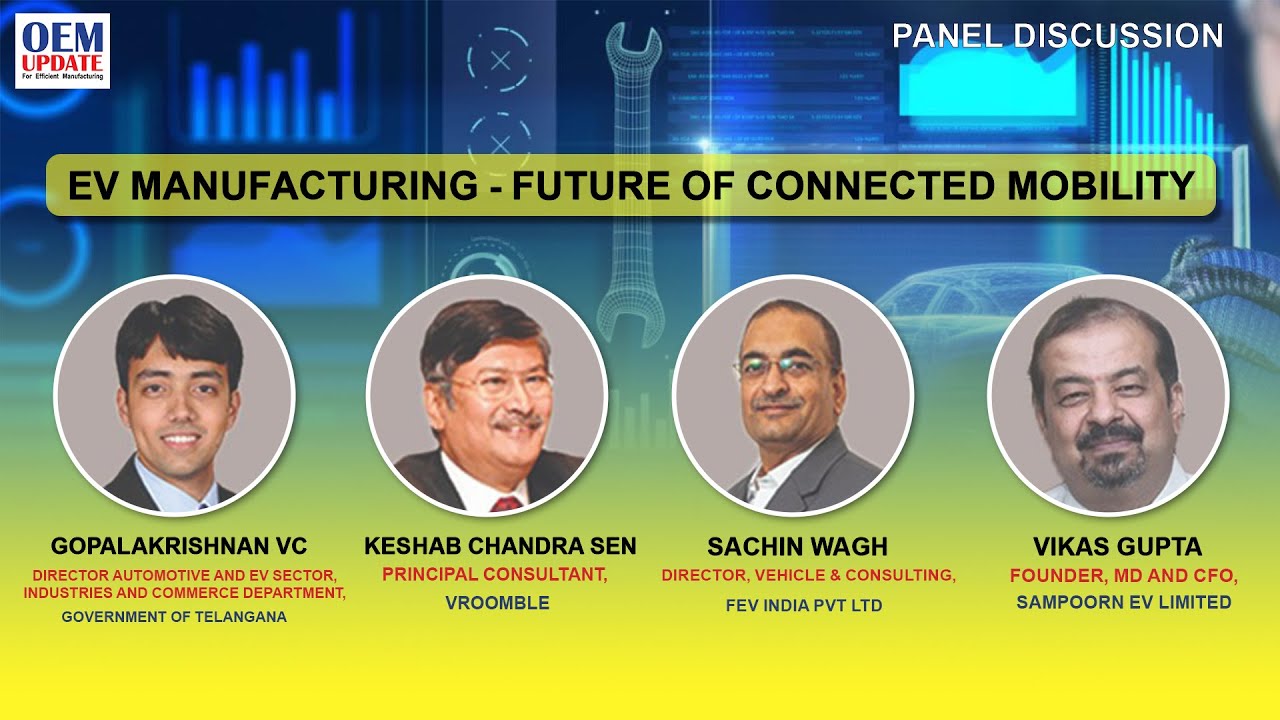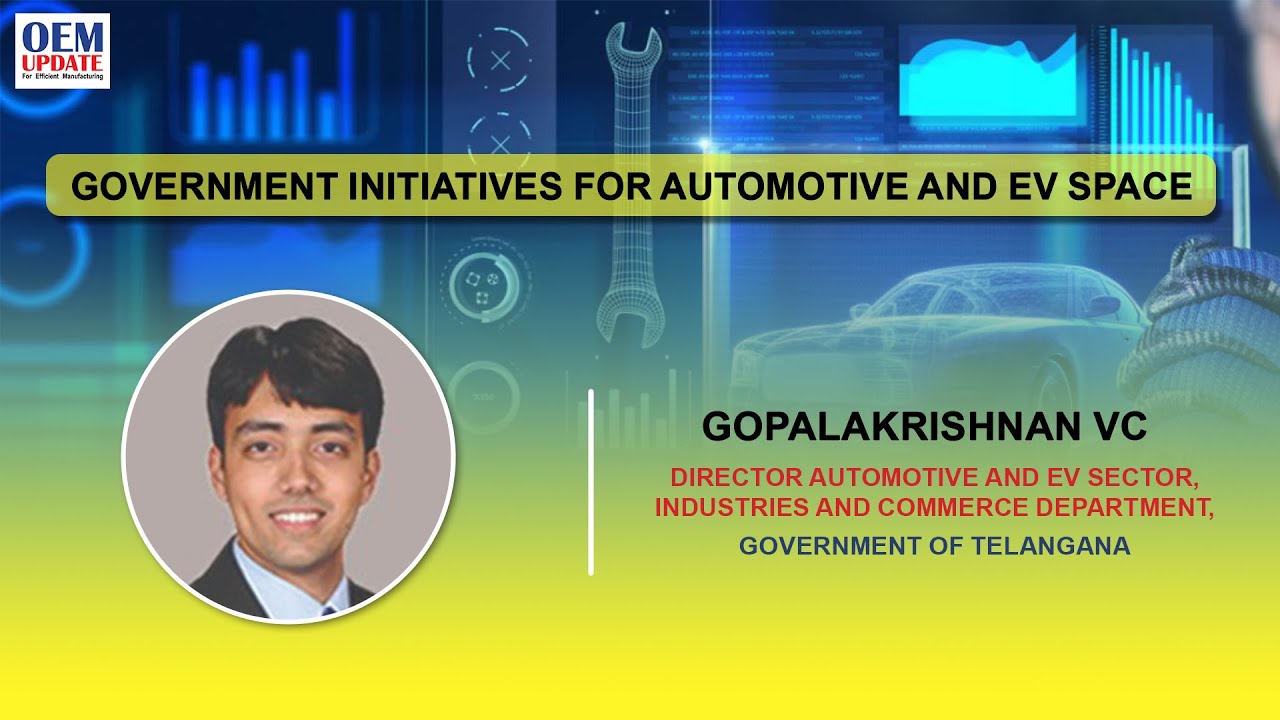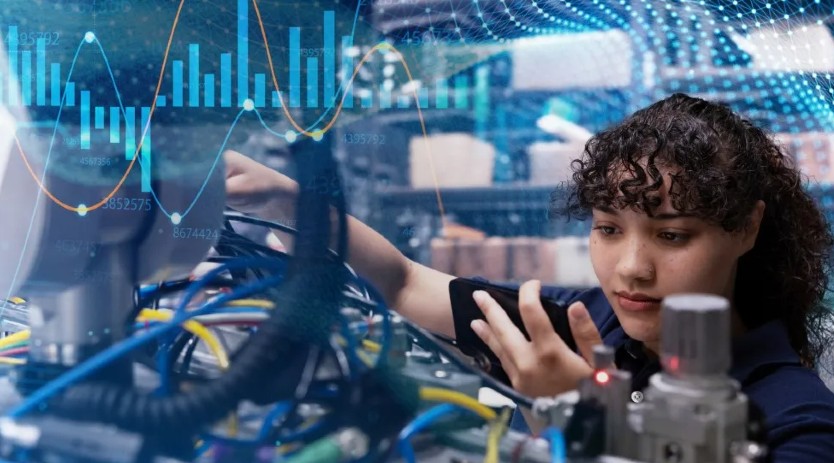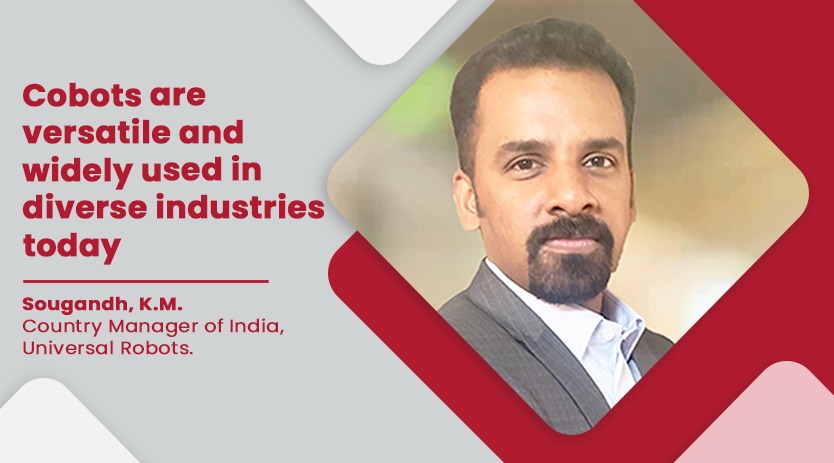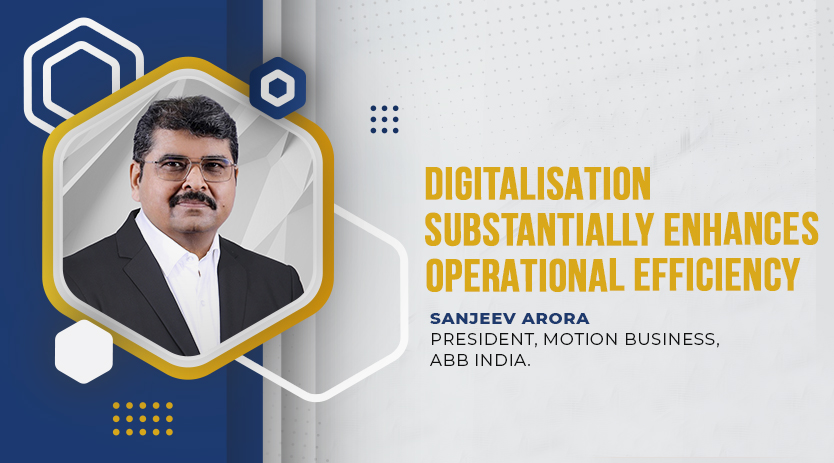Taking industrial automation to new level in robotics
June 9, 2021 12:03 pm
Cobots are the new economical alternative to expensive, traditional industrial robots as they make automation affordable.
Ajay Gurjar, COO & Director, YASKAWA India Pvt. Ltd., in an interview with OEM Update, explains how AI, machine learning and robotics go hand in hand to bridge barriers in Indian industries.
Indian industries have embraced industry 4.0 and its Technologies to carve bright future of Indian manufacturing. With this level of acceptance how ready are we to accept Robotics as an essential technology to enhance the industrial experience?
Apart from building long-term competitiveness on the global stage, India stands to gain significantly from adopting Industry 4.0 in Indian prospects. Yaskawa is the leader in Robotics and Motion control technology and has been addressing innovation since its inception. So, we have redefined our vision as the “Automation and optimisation of factories through i3-Mechatronics” and “New fields of mechatronics application for sustainable social development.” Under Transform Business Model through i3-Mechatronics, we are further accelerating the transformation to a business model based on the unique Yaskawa Group solution concept “i3-Mechatronics” and aim to enhance the functions of technology development, production, and sales.
In this concept, Yaskawa has developed the YASKAWA COCKPIT (hereinafter called, “YCP”) data management system as a step towards the realisation of the i3-Mechatronics solution. The data necessary is collected from devices connected to the YCP and accumulated in a database by using a data collection app that is executed as an add-on application. Users provided with a WebAPI as the interface for this database access can use this WebAPI to build their own original application software to match their particular needs. General-purpose add-on applications for use in manufacturing workplaces have been prepared in advance in the YCP to satisfy the needs of all levels of industry segment.
With the advent of AI and Robotics, connected data enterprise, what are the major Areas where the industry witness transformation and business prospectus?
Post COVID-19 crisis is forcing companies to rethink the direction of their operational strategies, changing both the business issues they want to address and Industry 4.0. The top digitisation drivers tend to vary by industry, but this year agility, flexibility, and manufacturing efficiency were common priorities for respondents from all sectors and geographies. Their goals may have aligned, but significant sectoral differences in maturity remain. As the automotive sector reports the greatest progress in the at-scale application of Industry 4.0 technologies, AI and Robotic automation, while energy and materials companies and CPG players report the least. Companies in the travel, transport, and logistics sector were the only group to report significant progress over the past few years in AI and connected data enterprise.
In order to respond to these needs, Yaskawa has worked to reinforce solution proposal capabilities and is proposing the “i3-Mechatronics” digital data solution concept that links the virtual and the real with all-Yaskawa component solutions Also, our Robotics future vision will aid better delivery in hospitals, rehabilitation places, education, and advance into comprehensive human assist solutions. Yaskawa takes Industrial Automation to new levels in Robotics. The Healthcare industry, manufacturing, finance, retail, and customer service are the major areas that have witnessed the transformation in a tremendous way.
How is AI, machine learning and Robotics Bridging the manufacturing technology gap in Indian industries?
If we look at technology, it has become more advanced than ever before. With AI, robotics automation, Big Data, IoT and machine learning, we can analyse the current process with all big data understand the real issue in our manufacturing process and bridge the gap related to quality, timeline, asset utilisation also reducing the gap due to downtime. AI systems help manufacturers forecast when or if functional equipment will fail so its maintenance and repair can be planned before the disappointment happens. Manufacturers can likewise improve productivity while reducing the cost of machine failures. Machine learning on the other hand is amplifying the organisation’s value by improving its logistics process, inventory management, Asset Management, and supply-chain management. Robots protect labourers from redundant and commonplace hazardous errands while likewise creating more desirable jobs by reshoring more manufacturing work. AI, machine learning and robotics go hand in hand and bridges any barrier in Indian industries.
What are the challenges for the SME and MSME sector in adopting factory automation, digitization, and robotics for efficient manufacturing processes?
Small and Medium Enterprises (SMEs) are a very important ingredient of a country and its business ecosystem. They contribute to the economy, employment and complement the larger companies and conglomerates to operate seamlessly. For any country, it is critical for its SMEs to perform optimally. The government, in countries such as India, has taken a keen interest in encouraging entrepreneurship across sectors so that many SMEs are created across the length and breadth of the country.
Well-functioning SME ecosystem enables a nation to enhance productivity, and output across sectors, as well as accelerate the pace of exports. It enables the development of the business landscape across Tier 2, Tier 3 cities, and beyond.
However, there are challenges that the SMEs must overcome to embrace technology and embark on the path of digital transformation. For Ex: Insufficient Growth Capital: As SMEs comprise a few proprietors who bring in limited capital with respect to their equity. They work with cost and margin pressures and focus more on sales and sustenance. Hence, they often do not seem to have sufficient growth capital and hence, technology adoption and digital transformation is often put on the back burner. Lack of Awareness of “Digital Transformation” Impact: There are SMEs who are not aware of the impact that Digital Transformation can have on business enablement and acceleration as well as customer retention and loyalty. Hence, the decision to embrace a Digital Transformation roadmap is often delayed or not taken at all. Also, SMEs struggle to process, handle, analyse, and turn data into information for business decision-making due to a lack of inherent technology expertise and the dynamic nature of digital technologies. When it comes to adopting emerging technology, SMEs are concerned with managing data, processes, and the cloud, as well as training the tools needed to do so.
We believe that these challenges can be overcome, and the result of a successful digital transformation by an SME could be sustainable growth and value creation. Clover Infotech has crafted a White Paper to empower SMEs – the true growth engines of our economy – to take their first steps towards Digital Transformation.
Yaskawa understands the SME and MSME issues & made all our products adaptable with Industry 4.0 as a standard feature and also providing solution with YCP and its Add-on function to satisfy all level of customer with basic to higher level of digitisation and factory automation solution.
Collaboration of humans and machine (robots and cobots) are expected to play a key role in carving India’s future. How do you see India’s future with robots?
The adaption of Robots and Cobots have recently expanded in several fields by improving agility, precision, and enhancing protection functions for coexistence with humans, and will continue to advance in the future. Cobots are the new economical alternative to expensive, traditional industrial robots as they make automation affordable and accordingly are a realistic choice especially for SME and MSMEs. Unlike traditional more complex robot execution, which requires an upfront investment in training, Cobots technology provides simple, intuitive robot programming and operation methods for your workforce. Cobots can be easily adapted to changing manufacturing requirements and can readily be deployed and redeployed for the next job.
Yaskawa’s MOTOMAN-HC Series robots with IP67 category can switch between safe collaborative speed and high speed, operate without additional protective measures like a safety fence, depending on the risk assessment. Operator’s safety is assured by a Power and Force Limit technology that stops the robot in case of contact with an operator.
Cookie Consent
We use cookies to personalize your experience. By continuing to visit this website you agree to our Terms & Conditions, Privacy Policy and Cookie Policy.



